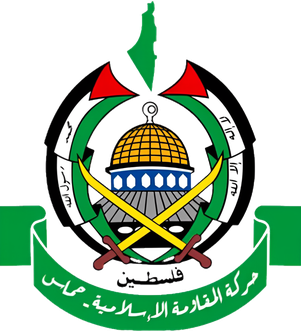
Hamas, an acronym of its official name, Harakat al-Muqawama al-Islamiya, is a Palestinian Sunni Islamist political and military movement governing parts of the occupied Gaza Strip.

Israeli settlements or colonies are civilian communities where Israeli citizens live, almost exclusively of Jewish identity or ethnicity, built on lands occupied by Israel since the Six-Day War in 1967. The international community considers Israeli settlements to be illegal under international law, though Israel disputes this.

Palestinians or Palestinian people, also referred to as Palestinian Arabs, are an ethnonational group descending from peoples who have inhabited the region of Palestine over the millennia, and who are today culturally and linguistically Arab.

The Palestinian National Authority, commonly known as the Palestinian Authority and officially the State of Palestine, is the Fatah-controlled government body that exercises partial civil control over West Bank areas "A" and "B" as a consequence of the 1993–1995 Oslo Accords. The Palestinian Authority controlled the Gaza Strip prior to the Palestinian elections of 2006 and the subsequent Gaza conflict between the Fatah and Hamas parties, when it lost control to Hamas; the PA continues to claim the Gaza Strip, although Hamas exercises de facto control. Since January 2013, the Palestinian Authority has used the name "State of Palestine" on official documents, although the United Nations continues to recognize the Palestinian Liberation Organization (PLO) as the "representative of the Palestinian people".

The Palestine Liberation Organization is a Palestinian nationalist coalition that is internationally recognized as the official representative of the Palestinian people. Founded in 1964, it initially sought to establish an Arab state over the entire territory of the former Mandatory Palestine, advocating the elimination of the State of Israel. However, in 1993, the PLO recognized Israeli sovereignty with the Oslo I Accord, and now only seeks Arab statehood in the Palestinian territories that have been militarily occupied by Israel since the 1967 Arab–Israeli War.

The West Bank, so called due to its relation to the Jordan River, is the larger of the two Palestinian territories. A landlocked territory near the coast of the Mediterranean Sea in the Levant region of West Asia, it is bordered by Jordan and the Dead Sea to the east and by Israel to the south, west, and north. The territory has been under Israeli occupation since 1967.

The Israeli–Palestinian conflict is an ongoing military and political conflict in the Levant. Beginning in the mid-20th century, it is one of the world's longest-continuing conflicts. Key areas of the conflict include the Israeli occupation of the West Bank and Gaza Strip, the status of Jerusalem, Israeli settlements, borders, security and water rights, as well as Palestinian freedom of movement and the Palestinian right of return.

The Palestinian territories are the two regions of the former British Mandate for Palestine that have been occupied by Israel since the Six-Day War of 1967, namely the West Bank and the Gaza Strip. The International Court of Justice (ICJ) has referred to the West Bank, including East Jerusalem, as "the Occupied Palestinian Territory", and this term was used as the legal definition by the ICJ in its advisory opinion of July 2004. The term occupied Palestinian territory was used by the United Nations and other international organizations between October 1999 and December 2012 to refer to areas controlled by the Palestinian National Authority, but from 2012, when Palestine was admitted as one of its non-member observer states, the United Nations started using exclusively the name State of Palestine. The European Union (EU) also uses the term "occupied Palestinian territory". The government of Israel and its supporters use the label "disputed territories" instead.
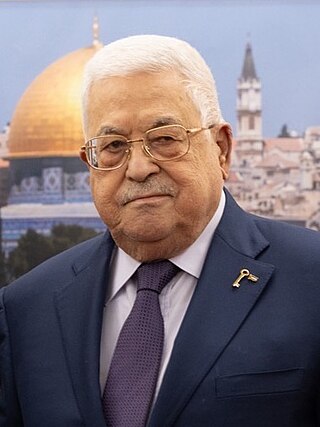
Mahmoud Abbas, also known by the kunya Abu Mazen, is the president of the State of Palestine and the Palestinian National Authority (PNA). He has been the chairman of the Palestine Liberation Organization (PLO) since 2004, PNA president since January 2005, and State of Palestine president since May 2005. Abbas is also a member of the Fatah party and was elected chairman in 2009.

Palestine, officially the State of Palestine, is a state in the Southern Levant region of West Asia. Founded on 15 November 1988 and officially governed by the Palestine Liberation Organization (PLO), it claims the West Bank and the Gaza Strip as its territory, all of which has been Israeli-occupied territories since the 1967 Six-Day War. The West Bank contains 165 Palestinian enclaves that are under partial Palestinian rule, but the remainder, including 200 Israeli settlements, is under full Israeli control. The Gaza Strip was governed by Egypt but conquered by Israel in 1967. Israel governed the region until it withdrew in 2005; although it is still considered to occupy Gaza. Hamas seized power after winning the 2006 Palestinian legislative election. The Gaza Strip has since been blockaded by Israel and Egypt.
Issues relating to the State of Israel and aspects of the Arab–Israeli conflict and more recently the Iran–Israel conflict occupy repeated annual debate times, resolutions and resources at the United Nations. Since its founding in 1948, the United Nations Security Council, has adopted 79 resolutions directly related to the Arab–Israeli conflict as of January 2010.
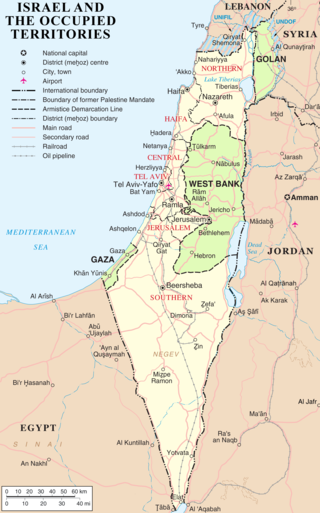
Israel has occupied the Palestinian territories and the Golan Heights since the Six-Day War of 1967. It previously occupied the Sinai Peninsula and southern Lebanon as well. Prior to Israel's victory in the Six-Day War, occupation of the Palestinian territories was split between Egypt and Jordan, with the former having occupied the Gaza Strip and the latter having annexed the West Bank; the Sinai Peninsula and the Golan Heights were under the sovereignty of Egypt and Syria, respectively. The first conjoined usage of the terms "occupied" and "territories" with regard to Israel was in United Nations Security Council Resolution 242, which was drafted in the aftermath of the Six-Day War and called for: "the establishment of a just and lasting peace in the Middle East" to be achieved by "the application of both the following principles: ... Withdrawal of Israeli armed forces from territories occupied in the recent conflict ... Termination of all claims or states of belligerency and respect for and acknowledgment of the sovereignty, territorial integrity and political independence of every State in the area and their right to live in peace within secure and recognized boundaries free from threats or acts of force."

Israel's policies and actions in its ongoing occupation of the Palestinian territories have drawn accusations that it is committing the crime of apartheid. Leading Palestinian, Israeli and international human rights groups have said that the totality and severity of the human rights violations against the Palestinian population in the occupied territories, and by some in Israel proper, amount to the crime against humanity of apartheid. Israel and some of its Western allies have rejected the accusation, with the former often labeling the charge antisemitic.

The Legal Consequences of the Construction of a Wall in the Occupied Palestinian Territory of 9 July 2004 is an advisory opinion issued by the International Court of Justice (ICJ) in relation to the Israeli West Bank barrier.
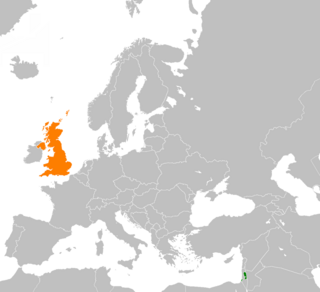
The United Kingdom does not recognise Palestine as a state. The UK has a non-accredited Consulate General in Jerusalem that "represents the UK government in Jerusalem, West Bank, and Gaza", and works on "political, commercial, security and economic interests between the UK and the Palestinian territories". Husam Zomlot became head of the Palestine Mission to the United Kingdom in 2018. The State of Palestine was represented in London by Manuel Hassassian, the Palestinian General Delegate to the United Kingdom between 2005 and 2018. Another former Palestinian General Delegate to the UK was Afif Safieh, who began in that role in 1990.

Palestine 194 is an ongoing diplomatic campaign by the Palestinian National Authority to gain membership in the United Nations for the State of Palestine. The name of the campaign is a reference to Palestine becoming the 194th member of the UN. The UN campaign is part of a strategy to gain international recognition of the State of Palestine, based on the borders prior to the Six-Day War, with East Jerusalem as its capital. The initiative developed during a two-year impasse in negotiations with Israel that followed the latter's refusal to freeze its settlement activities in the West Bank. The campaign was reported in the media as early as late 2009, and gained prominence during the leadup to the 66th Session of the General Assembly in September 2011. Palestinian President Mahmoud Abbas submitted the application to the Secretary-General Ban Ki-moon on 23 September 2011, which the Security Council has yet to vote on.
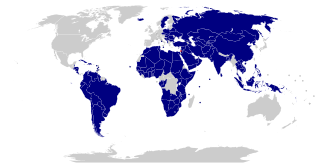
The foreign relations of the State of Palestine have been conducted since the establishment of the Palestine Liberation Organization (PLO) in 1964. Since the Oslo Accords, it seeks to obtain universal recognition for the State of Palestine on the 1967 borders, with East Jerusalem as its capital. As of 2 June 2023, 139 of the 193 United Nations (UN) member states officially recognize the State of Palestine.
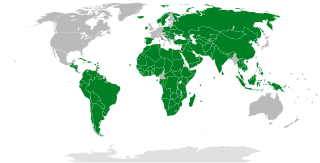
The State of Palestine has been accepted as an observer state of the United Nations General Assembly in November 2012. As of 2 June 2023, 139 of the 193 United Nations (UN) member states have recognized the State of Palestine. In contrast Israel is recognized by 165.

The Palestine Solidarity Campaign (PSC) is an activist organisation in England and Wales. It was founded in the UK in 2004 and incorporated that year as Palestine Solidarity Campaign Ltd. In 2023, The Guardian described it as "Europe’s largest Palestinian rights organisation".
There are a wide variety of views regarding the legal status of the State of Palestine, both among the states of the international community and among legal scholars. The existence of a state of Palestine, although controversial, is a reality in the opinions of the states that have established bilateral diplomatic relations. It is a non-member observer state at the United Nations since November 2012. As of 2 June 2023, a total of 139 countries recognize it.
















